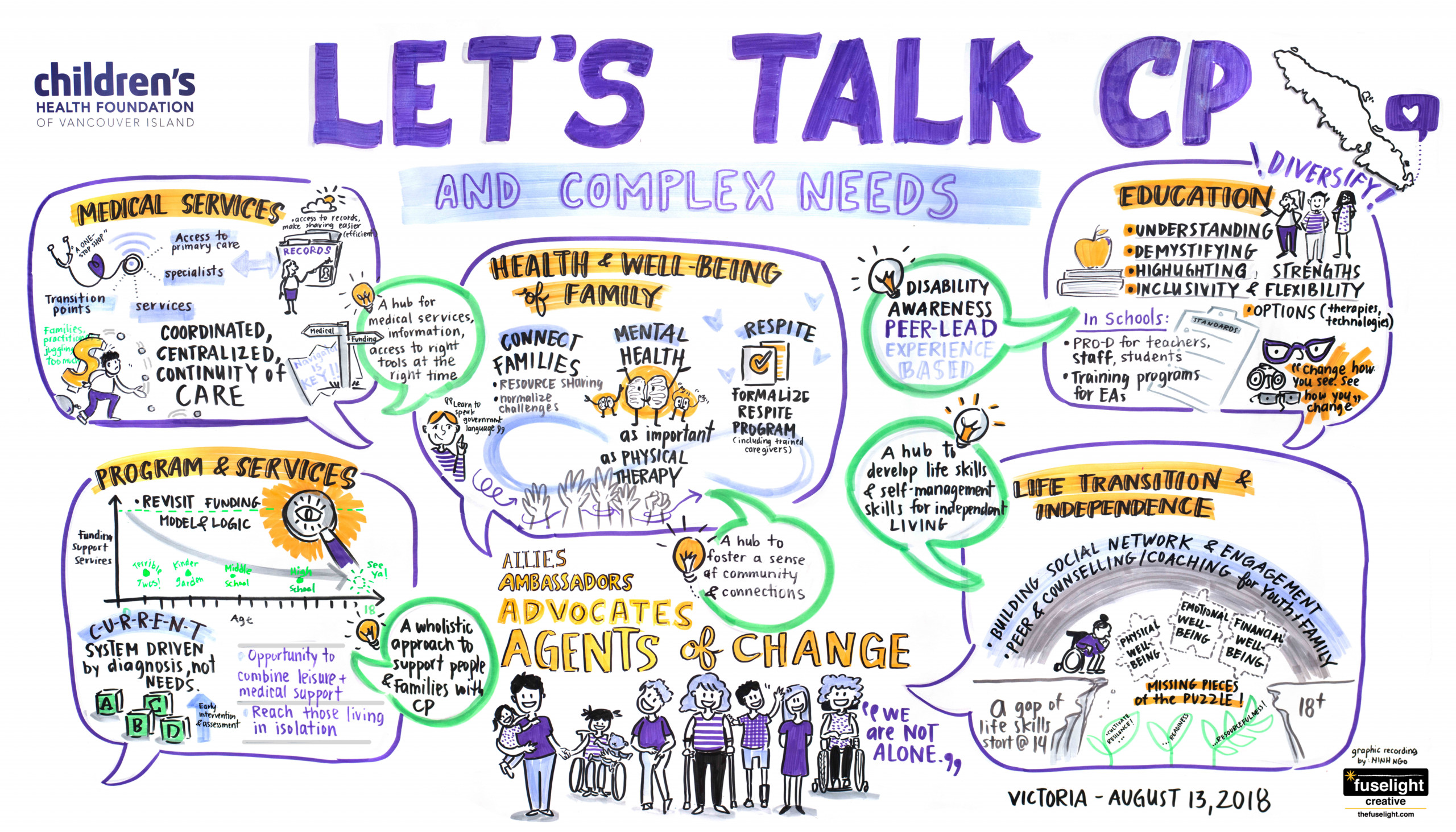
Ask the expert: Elizabeth Specht on how families with children with cerebral palsy are adapting to COVID-19
Throughout the COVID-19 pandemic, Children’s Health Foundation is committed to supporting Island families. This post is part of our Ask the Expert blog series in which our CEO Veronica Carroll interviews experts across Vancouver Island and the surrounding islands on issues affecting children’s health and how families are adapting during these unprecedented times.
This week, Veronica connected with the Executive Director of one of our community partners, Elizabeth Specht of the Cerebral Palsy Association of British Columbia. They spoke about the community impact of the Association’s work, how the COVID-19 pandemic is impacting families’ ability to access support services, and the unique challenges faced by families with cerebral palsy.
Can you tell us about the community impact of the Cerebral Palsy Association of British Columbia?
As the community support service for families across British Columbia with cerebral palsy, we are committed to raising awareness in the community and assisting those living with cerebral palsy to reach their maximum potential. We carry this out through services ranging from support groups, to bursaries for post-secondary education and families in need of assistance, to recreational programming, which includes adapted dance and yoga classes and creative art sessions. Our team also connects families to the supports they need by providing referrals to other education, advocacy, and crisis services. One of the most impactful aspects of our work is connecting families to create peer-to-peer relationships with others who have children with cerebral palsy. These relationships often form organically when parents bring their kids to our recreational programming; many socialize and end up exchanging contact information while they wait for their little ones. Building authentic community connections is exactly why we do what we do.
What is the process of getting a diagnosis of cerebral palsy?
Cerebral palsy is not immediately apparent, and it can be complicated to get a diagnosis – especially if you live in a rural or remote area with fewer nearby health services. It often isn’t diagnosed until a child is two years old, and in some cases, a diagnosis isn’t made until teenage or adult years. Usually resulting from a one-time brain trauma during pregnancy or delivery, there are five levels of cerebral palsy. Like many disabilities, suspicions arise when developmental milestones are not being met. Family doctors often refer patients to a neurologist for a diagnosis.
How has the COVID-19 pandemic affected families with children with cerebral palsy?
It depends on the level of cerebral palsy; if I asked several parents that question, the answer would vary greatly. Since respite services, speech therapy, and physical therapy are not available right now, parents have become everything for their child during the pandemic. Many are trying to adapt to therapy at home as best as they can. Parents have now become full-time, round the clock caregivers to their children, when typically, many families would have caregivers in their home to assist their child. This is taking an emotional toll on families.
Has the Cerebral Palsy Association of British Columbia had to adjust the way its services are delivered because of the pandemic? If so, how?
Absolutely. We have transitioned to virtual operations, which has been a silver lining throughout these difficult times. Now that we are offering our dance, yoga, youth group, support groups, and other services online, we have been able to reach a greater number of people across the province who normally wouldn’t be able to attend our programs in person. Offering a wider variety of virtual services to serve remote families with cerebral palsy was already part of our strategic plan, so we’ve fortunately moved towards this target more quickly than planned. And as we’re meeting new families through digital platforms, they’re giving us brand new suggestions on how we can help the community.
As access to care has been limited due to the pandemic, are there any other alternatives that families are using to manage?
I recently spoke with a mom who has three kids, one of whom has cerebral palsy. She is beyond overwhelmed, as she is unable to have her caregiver in to assist, and so she can’t leave the house because her child with cerebral palsy requires constant care. She told me that they’re simply managing day-by-day. Many community organizations, like ours, are doing their best to provide virtual support services. We will soon be offering generalized physical therapy online so that families can access some form of therapy during this time while they can’t access their normal specialized care. Our team is also holding a virtual story time, which gives parents a momentary break to pause while their child’s attention is elsewhere.
What unique challenges are families with children with Cerebral Palsy facing amidst physical distancing?
For families with children cerebral palsy, it’s challenging at the best of times. Parents are worried that their children are falling behind in their speech and physical therapy. While some parents are holding modified therapy sessions at home, others are not able to as their children or teenagers require assistance being lifted.
What resources are available to families with children and youth living with cerebral palsy at this unprecedented time?
Our website has a COVID-19 resource page and a general resource page to support those living with cerebral palsy, and families are always welcome to contact us so that we can point them in the right direction of how to access a specific resource or service.
Leave a Reply
Want to join the discussion?Feel free to contribute!